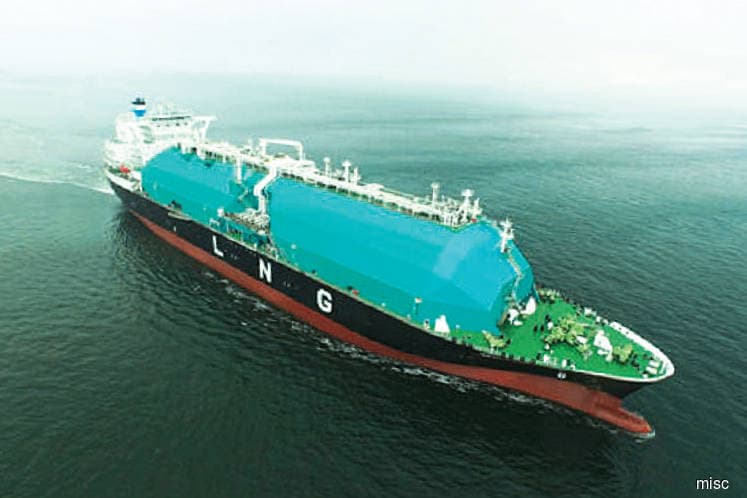
This article first appeared in The Edge Malaysia Weekly on June 25, 2018 - July 1, 2018
NATIONAL oil company Petroliam Nasional Bhd (Petronas) and 12 other international outfits have been shortlisted to develop three floating, storage and regasification units (FSRUs) in Lebanon.
News reports out of Lebanon and international shipping publications put the value of the contract to build the three FSRUs at about US$1.2 billion (RM4.81 billion), with the three ships slated to be moored at Beddawi, near Tripoli; Selaata, north of Beirut; and Zahrani, which is close to Tyre; as recommended by advisers Poten & Partners.
“Yes, Petronas has been shortlisted, but it [the bidding] is quite competitive. Some of the shortlisted companies are consortiums, which are technically very strong,” says an oil and gas (O&G) executive who is familiar with the bidding.
The consortiums prequalified include Japan’s Kawasaki, Norway’s K-Line and US’ Fluor; a partnership between Italy’s Eni and Qatar Petroleum International; a joint venture between Singapore’s BW, Dutch company Vitol with two Lebanese companies Almabani and Butec; another partnership involving US-based Excelerate with British Dutch Shell partnering Lebanese outfit BB Energy; another involving Norway’s Golar Power in partnership with Consolidated Contractors Company of Greece; the Phoenicia Energy Consortium; and lastly, France’s Total working with Norway’s Hoegh.
Japan’s Mitsui & Co, South Korea’s Kogas, the UK’s BP, France’s Engie and Spain’s Gas Natural Fenosa have made standalone bids.
It is understood that offers from the 13 prequalified companies are due by Oct 1, and the decision on the preferred bidder will be made early next year.
In the O&G sector, FSRUs are required as liquefied natural gas (LNG), chilled to -162°C, is transported via tankers to an FSRU moored close to shore where it is re-converted into gas and piped to power plants and other users. FSRUs are popular as they are only about half the cost of onshore LNG import terminals.
Its 62.67% ownership of MISC Bhd stands Petronas in good stead, given the former’s expertise in shipping petroleum products and operating floating production and storage systems.
MISC has a fleet of 28 LNG ships, 88 petroleum carriers, six floating production, storage and offloading (FPSO) vessels, five floating storage and offloading (FSO) vessels, two mobile offshore production units (MOPU), two floating storage units or FSUs and one semi-submersible floating production system.
In addition, MISC owns 66.5% of Malaysia Marine and Heavy Engineering Holdings Bhd, which operates two yards with nearly 180ha of yard space, plus a large dry-docking facility.
The synergies these units provide could boost Petronas’ bid.
Possibly because of non-disclosure agreements, Petronas did not respond to The Edge’s queries.
Last month, a news report out of Lebanon indicated the country’s Ministry of Energy and Water had launched a request for proposal for the three FSRUs after 13 international and local consortiums prequalified to participate in the tender. However, this was only picked up by international shipping and O&G publications last week.
The initial plan was for the three FSRUs to be operational by 2020, but it is not clear if this has changed. Not spared the conflict in the Middle East, Lebanon concluded an election in May this year after a nine-year lapse.
Lebanon’s plans for an FSRU date back to as early as 2013, when the Ministry of Energy and Water prequalified 13 companies for a single FSRU but the plan hit a brick wall as a result of political uncertainties. The plan to utilise FSRUs cropped up again late last year when the ministry sought proposals for three floating regasification units, largely to power new and existing power plants.
At present Beddawi has 465mw of power generation capacity, with plans for an additional 569mw and 425mw via a barge.
Selaata has 194mw of generation capacity at Zouk power plant and an additional 180mw from a barge, but there are plans to build another 1,000mw to 1,200mw facility.
Zahrani at present has 465mw of power generation capacity but has plans for a barge to generate 425mw plus an additional 500mw to 600mw.
Thus, the need for the three FSRUs is understandable. Although 13 outfits were shortlisted, some 33 companies had submitted bids to develop the FSRUs.
For Petronas, securing such a contract could put it in a good position to bag more such jobs.
Other than Lebanon, Greece, Israel and Cyprus are also understood to be evaluating FSRU projects. Greece has proposed a second FSRU terminal — Aegean LNG in Kavala Bay — while Turkey is looking to increase capacity at the Marmara Ereglisi and EgeGaz Aliaga terminals by two-thirds in 2018 and 2021, respectively.
Owing to recently discovered gas deposits off Egypt, Israel and Cyprus, the Eastern Mediterranean gas fields have come into greater focus.
In October last year, Lebanon’s energy ministry had also launched a tender to design, finance, build and operate up to three LNG import terminals.
Save by subscribing to us for your print and/or digital copy.
P/S: The Edge is also available on Apple's AppStore and Androids' Google Play.